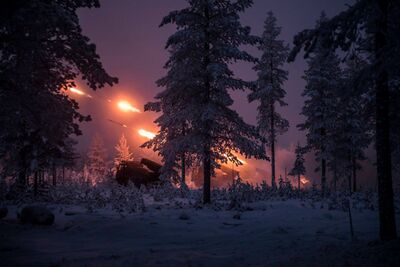Ruvelkan Winter Counter-Offensive
| Ruvelkan Winter Counter-Offensive | |||||||
|---|---|---|---|---|---|---|---|
| Part of Zemplen War | |||||||
 Ruvelkan artillery fires on Syaran position. | |||||||
| |||||||
| Belligerents | |||||||
|
|
| ||||||
| Commanders and leaders | |||||||
|
|
| ||||||
| Units involved | |||||||
| Imperial Armed Forces of Ruvelka | Syaran Commonality Armed Forces | ||||||
| Strength | |||||||
| 3,250,000 personnel | 2,500,000 personnel | ||||||
| Casualties and losses | |||||||
|
26,488 killed 56,821 wounded |
20,871 killed 43,945 wounded 12,500 captured | ||||||
The Ruvelkan Winter Counter-Offensive (known as Operation: Szablya to the Imperial Armed Forces of Ruvelka) was a strategic offensive launched by Ruvelka during the Zemplen War from 13 November to 20 December 2008.
In September 2008 the Syaran Commonality Armed Forces had launched Operation Aspis with the intent to destroy the Ruvelkan military as a cohesive fighting force. By the end of October, the Syarans had captured Sarud, Balatonalmádi, Dunakesi, Pannonhalma, and Albertirsa, but the Ruvelkan armed forces remained functional. While both sides began rebuilding their forces after three months of fighting, Chancellor Edviná Molnár began pushing for a counter-offensive to drive the Syarans out of Ruvelka. General Áron Surány, Chief of the Imperial General Staff, was initially reluctant but eventually agreed to launch a strategic offensive towards the end of November. After some debate over where the offensive should be focused on the Syaran 9th Army and 1st Army, with diversionary attacks undertaken against other sections of the front. Ruvelka amassed nearly two and a half million troops for the offensive, against roughly 1,800,000 Syarans.
The offensive began on 23 November with a coordinated air offensive and infiltration efforts by Ruvelkan Imperial Fusiliers. The Syarans were caught partially off-guard, having expected a major offensive but uncertain of the scale and timing. Army Group Beta, the primary target of the Ruvelkans, was forced back in almost all sectors, but diversionary assaults against Alpha and Gamma were less successful. By 30 November the Ruvelkans were just 20 kilometers from Dunakesi, but in early December the Syarans began shifting armored and mechanized reserves towards critical sectors of the front. By 6 December Army Group Center had been halted in its entirety; General Surány wanted to call off the offensive but Chancellor Molnár insisted on keeping the initiative, leading to smaller offensives against Syaran forces near Sarud and Albertirsa. By 15 December Ruvelkan offensive efforts had halted, but sporadic fighting continued until the 19th. A Syaran request for a ceasefire for the Winter solstice was accepted on the 20th, which is generally used to mark the end of the offensive.
Although Ruvelka regained several hundred square kilometers of territory, the main objective of destroying the Syaran 1st and 9th Armies was not achieved. Although Ruvelkan troops demonstrated the ability to outflank and infiltrate Syaran formations, Ruvelkan commanders struggled to coordinate their operational maneuvers with one another, largely due to their pre-war emphasis on unit autonomy. Although they ultimately repelled the Ruvelkans, the Syarans were taken back by the scale of the offensive, which contradicted their assumptions that they had badly mauled the Ruvelkans beyond the capacity of such a large operation. The rest of the winter would largely be devoid of major fighting until the Syarans launched their first significant offensive of 2009 during Operation Synaspismos.